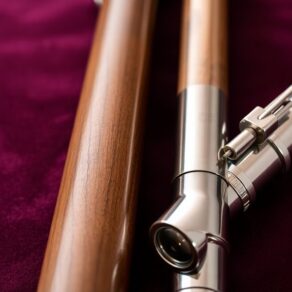Finding the best beginner flute for your budget is all about understanding your options. For tight budgets, consider used flutes or rental programs, as they offer solid performance without the hefty price tag. Mid-range options like the Yamaha YFL-222 and Gemeinhardt 2SP provide excellent sound and comfort, ideal for beginners looking to progress. If you're aiming for premium quality, brands like Powell and Yamaha deliver craftsmanship that enhances your playing experience. Your choice affects not just sound but your overall musical journey, so keep exploring to uncover more nuances that can aid your selection.
Understanding Flute Types
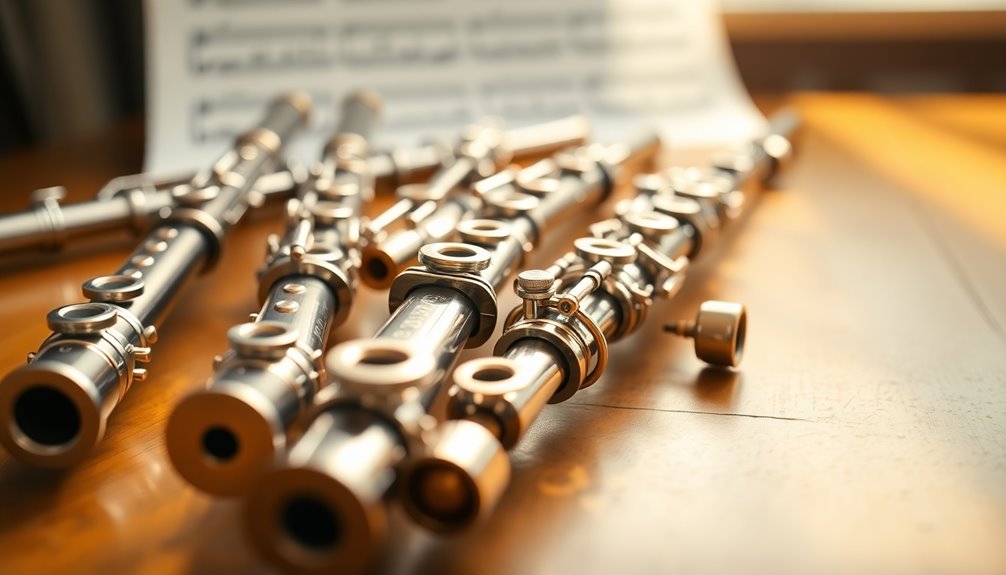
What types of flutes are out there, and how do they differ? When diving into the world of flutes, you'll discover a variety of types, each with its unique characteristics and history. The most common type is the concert flute, typically made from metals like silver or nickel. Its design has roots in centuries of flute history, evolving from wooden flutes used in the past to the sleek instruments we're familiar with today.
You might also encounter the piccolo, a smaller, higher-pitched version of the concert flute, often used in orchestras to add brightness to the sound. It's usually made from similar materials but requires a slightly different technique due to its size.
Then there's the alto flute, which offers a deeper, mellower tone, making it a favorite for certain musical styles. It's generally crafted from silver or even gold, giving it a rich sound that can be quite enchanting.
Additionally, you may find wooden flutes, such as the bamboo or Native American flutes, which provide a warm, organic sound. These flutes come in various materials, each affecting the instrument's timbre and resonance. The bass flute is another type to consider, known for its distinctive and resonant voice that adds depth to musical compositions.
Understanding these distinctions not only enriches your appreciation for the flute but also helps you choose an instrument that resonates with your musical journey. By familiarizing yourself with the types and materials, you'll feel more connected to the rich tradition of flute playing, no matter your skill level or budget.
Key Features to Consider
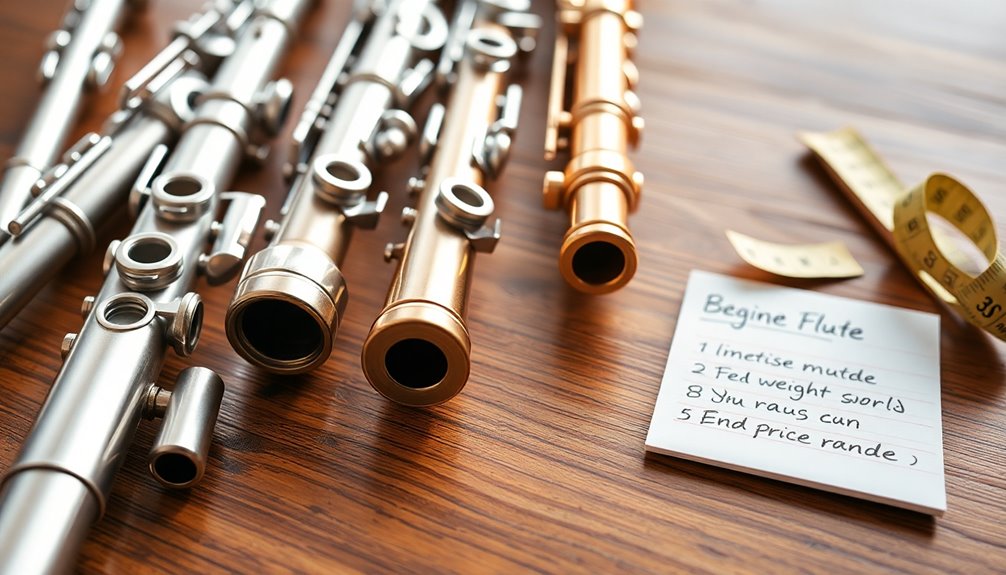
Choosing the right flute involves careful consideration of several key features that can greatly impact your playing experience. When you're starting out, two vital aspects to pay attention to are material quality and flute size.
Material quality affects not just the sound, but also the durability of your instrument. Most beginner flutes are made from silver-plated nickel or brass, which offer a good balance of affordability and sound quality. If you want something that feels more premium, consider flutes made from solid silver, though these are typically pricier.
Remember, the material can influence how the flute resonates, and a better material can enhance your overall experience as you learn. Additionally, many flutes are designed with a smooth keywork mechanism, which can significantly enhance playability for beginners.
Flute size is another important factor. Standard concert flutes are usually in the key of C, but if you're younger or have smaller hands, you might find a curved headjoint helpful, as it makes the instrument easier to hold.
Additionally, make certain to test how comfortable you feel while playing. A flute that's too big can lead to frustration, while one that's just right will encourage you to practice more.
Taking the time to assess these features guarantees that you choose a flute that suits your needs and supports your journey as a musician. A well-chosen instrument not only enhances your sound but also fosters a sense of belonging in the musical community.
Budget-Friendly Flute Options
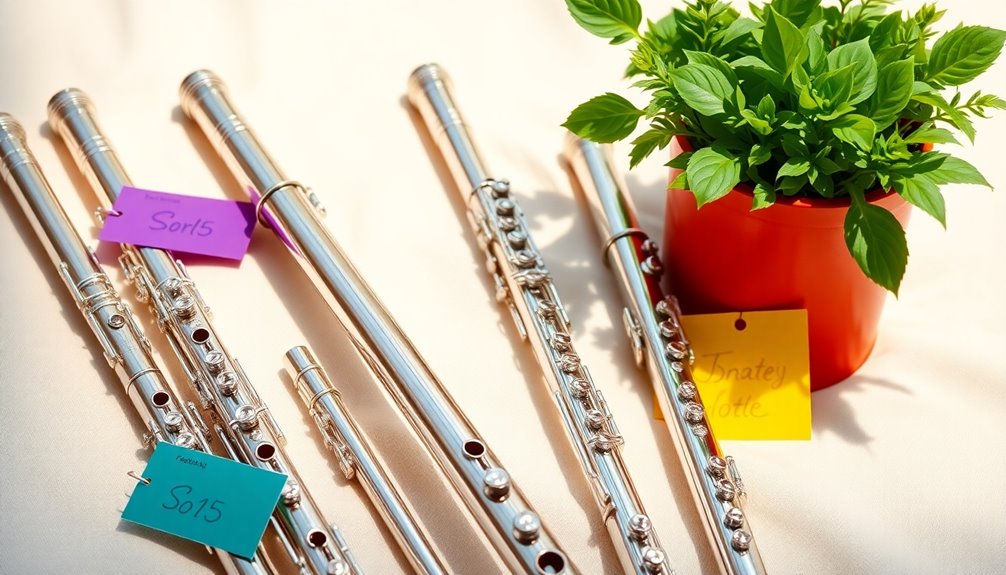
When you're on the hunt for a budget-friendly flute, it's essential to sift through various options that still deliver quality sound and playability. You might be surprised to find that you don't need to break the bank to get a decent instrument. Used flutes can be a fantastic choice, as many are available at considerably reduced prices while still offering solid performance.
Look for reputable brands, as they often maintain their value and sound quality even after years of use. Many music educators recommend Yamaha flutes as a reliable choice for beginners, ensuring a solid investment.
Another popular option is to explore rental options, especially if you're just starting out. Many music stores provide rental programs that allow you to try a flute without the commitment of a purchase. This way, you can assess your interest and progress before deciding to invest in a new instrument.
Rental options often include the latest models, meaning you'll have access to flutes that are well-maintained and up to date.
Additionally, don't forget to check online marketplaces and local music schools, where you may find used flutes in great condition. Many beginners have successfully moved from renting to owning their own instruments through these avenues.
By exploring these budget-friendly options, you can find a flute that feels right in your hands and inspires you to play. Remember, the goal is to find an instrument that not only fits your budget but also supports your journey into the world of music.
Happy flute hunting!
Mid-Range Flute Recommendations
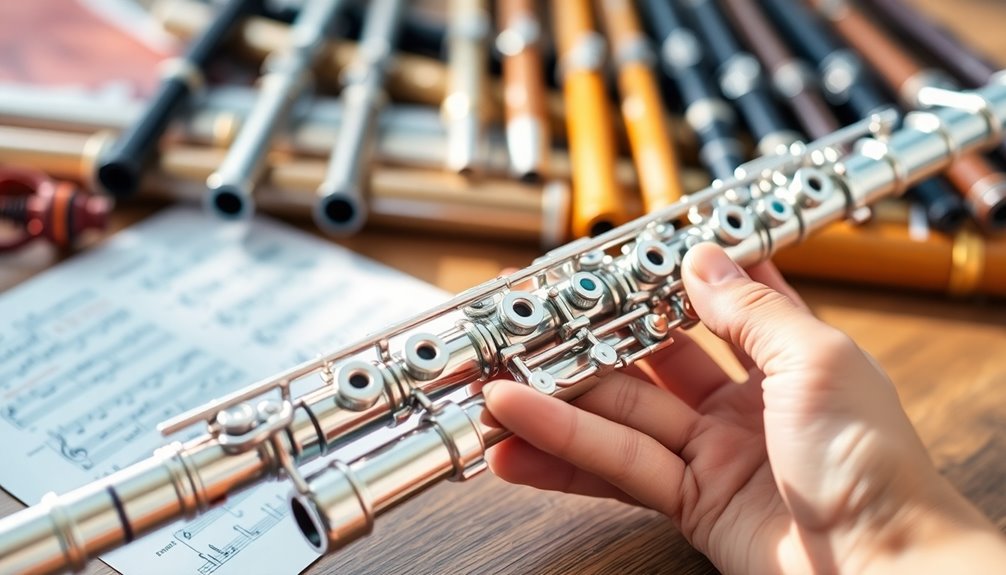
Are you ready to take your flute playing to the next level? Investing in a mid-range flute can greatly enhance your performance quality, allowing you to express yourself more fully and connect with your music.
Here are three solid mid-range brands that offer exceptional value:
- Yamaha YFL-222: Known for its reliability, this flute features a silver-plated body and excellent sound quality. It's perfect for players moving from beginner to intermediate levels, ensuring you can create beautiful melodies with ease.
- Gemeinhardt 2SP: This flute boasts a warm tone and great intonation, making it a favorite among many flutists. Its ergonomic design promotes comfort during long practice sessions, allowing you to stay focused on your music rather than your instrument.
- Azumi AZ2: With its solid silver headjoint, the Azumi AZ2 provides a rich, resonant sound that's hard to beat. The craftsmanship is exceptional, giving you the confidence to perform in front of others and truly enjoy your playing journey.
Investing in a mid-range flute can enhance your musical expression, making it easier to connect with fellow musicians and audiences alike.
Choosing the right mid-range flute can foster a sense of belonging within the musical community.
Each of these options not only offers superior performance quality but also nurtures your passion for playing. With the right instrument, you'll feel inspired to practice more and share your love for music with others.
Happy playing!
Premium Flutes for Beginners
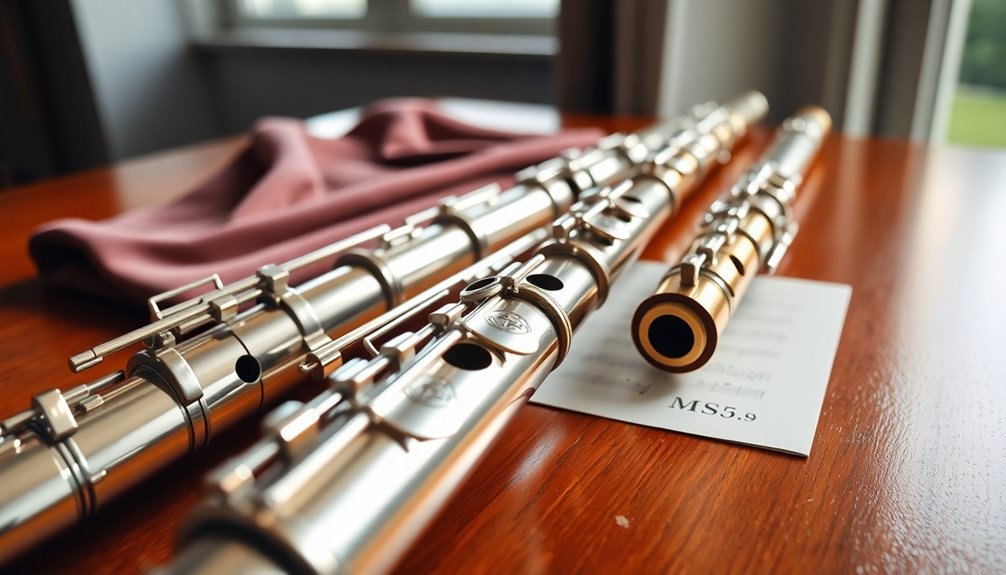
What makes a premium flute the right choice for a beginner? When you're just starting your musical journey, investing in a premium flute can greatly enhance your experience.
Premium flute brands, like Yamaha, Powell, and Gemeinhardt, are known for their craftsmanship, providing instruments that not only sound beautiful but are also easier to play. These flutes often feature advanced features such as solid silver bodies and keys, which contribute to richer tones and improved responsiveness, allowing you to express yourself more freely.
Choosing a premium flute means you won't outgrow it as quickly. Many beginners find that higher-quality instruments encourage them to practice more, as they're less frustrating to play. The smooth action of the keys and the overall balance of a premium flute can inspire confidence and motivate you to progress in your skills.
Moreover, premium flutes often come with better warranties and customer support, which can be reassuring for new players. You'll feel more connected to your instrument, knowing it's designed to last and grow with you.
While a premium flute may require a larger initial investment, think of it as a long-term commitment to your musical education. By starting with a quality instrument, you're setting yourself up for success, fostering a deeper connection with music that can last a lifetime. Additionally, many retailers offer a wide selection of top flutes for student musicians, ensuring you find the perfect instrument for your needs.
Embrace the journey and let a premium flute be your trusted companion along the way.
Tips for Choosing the Right Flute
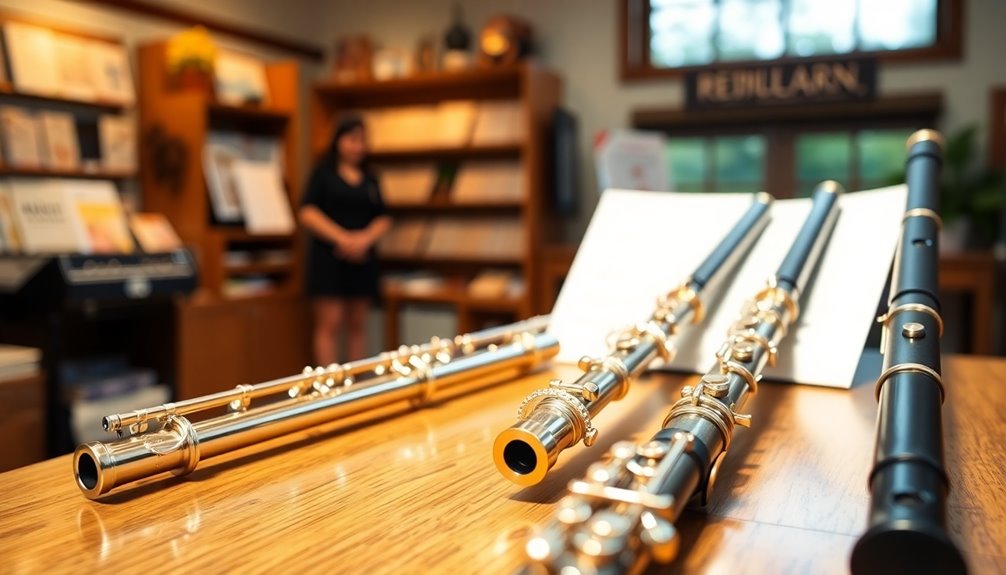
Choosing the right flute can feel overwhelming, but understanding your needs and preferences can simplify the process. Whether you're a complete novice or shifting from another instrument, selecting a flute that resonates with you is key to enjoying your musical journey.
Here are three essential tips to reflect on:
- Budget Wisely: Determine your budget before diving into the options. There's a range of flutes available at various price points. Investing a bit more can often lead to better sound quality, which can enhance your learning experience.
- Comfort and Playability: Pick a flute that feels comfortable in your hands. Try several models to see which one fits your fingers best. The right flute should feel natural and allow you to express yourself without frustration.
- Seek Learning Resources: Don't forget to explore flute learning resources. Many brands provide tutorials or access to online lessons. Engaging with these resources can make your flute journey smoother and more fulfilling. Additionally, consider investing in a quality instrument for a better overall experience.
As you commence on this exciting adventure, remember that flute maintenance tips will help keep your instrument in top shape.
It's all about building a foundation that not only supports your skills but also fosters a sense of belonging in the musical community. With these reflections in mind, you're well on your way to finding the perfect flute that resonates with your unique musical voice.
Caring for Your Flute
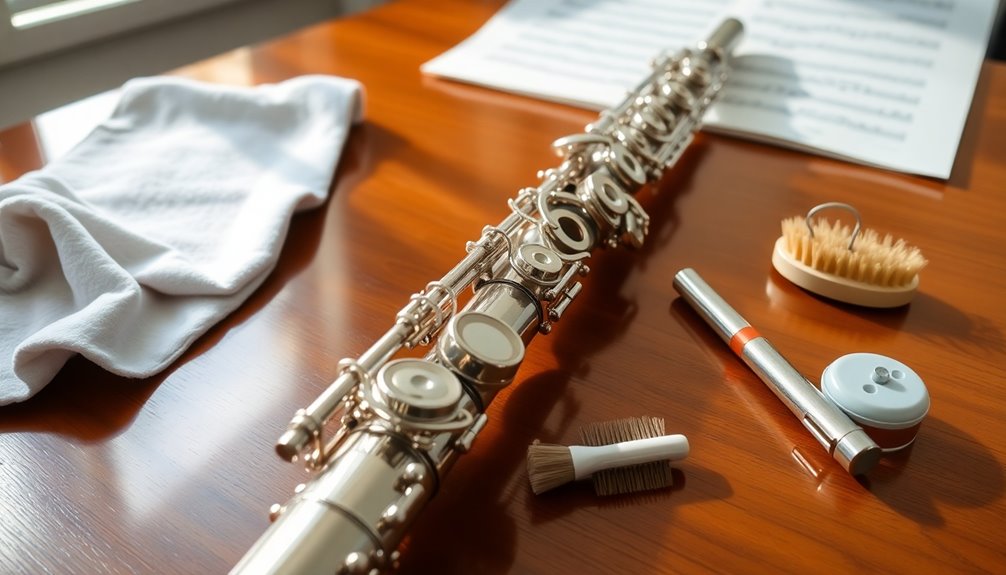
Caring for your flute is essential to guarantee its longevity and peak performance. Regular flute maintenance not only keeps your instrument sounding its best but also enhances your playing experience.
Start with some basic cleaning techniques after each session. Use a soft, lint-free cloth to wipe down the exterior, removing fingerprints and moisture that can cause damage over time.
For the interior, a cleaning rod and cloth are invaluable. Insert the rod gently into the flute, ensuring that you clean away any condensation that may have built up. This simple step can prevent corrosion and keep your pads in good shape.
Also, consider using a cleaning swab designed specifically for flutes to reach those hard-to-access areas. Regular cleaning with high-quality materials ensures efficient flute hygiene and performance.
Be mindful of your flute's environment, too. Avoid exposing it to extreme temperatures or humidity, as these conditions can warp the metal and affect the pads. When you're not playing, store your flute in its case to protect it from dust and accidental damage.
Finally, don't neglect periodic professional servicing. A technician can adjust mechanisms and replace worn pads, ensuring your flute continues to perform beautifully.
Frequently Asked Questions
How Long Does It Take to Learn the Flute?
Learning the flute can vary greatly depending on your practice time and commitment.
Generally, you might notice basic proficiency within a few months, but mastering it will take years. The learning curve is steep at first, as you'll need to develop breath control and finger coordination.
Regular practice, ideally 20-30 minutes daily, helps accelerate your progress.
Stay patient and enjoy the journey; every note you play brings you closer to your goals.
Can I Rent a Flute Instead of Buying?
Think of renting a flute like test-driving a car before committing.
Flute rental benefits include lower upfront costs and the chance to explore different models without the long-term commitment of buying.
Renting lets you decide if you truly love playing before making a purchase.
Plus, should you find you're not as passionate, you can easily return it, making renting a flexible option compared to buying.
It's a practical way to start your musical journey!
What Accessories Do I Need for Beginner Flutes?
When starting with a beginner flute, you'll want some essential flute accessories to enhance your experience.
A cleaning rod and cloth are vital for maintenance, ensuring your instrument stays in top shape. Consider a flute stand to prevent damage when you're not playing.
Don't forget a case cover for protection during transport and a metronome to help with timing.
Following these flute maintenance tips keeps your instrument sounding great and helps you progress!
Are Used Flutes a Good Option for Beginners?
Buying a used flute can feel like unearthing a treasure chest! The benefits of a used flute often outweigh the concerns.
You get a quality instrument at a fraction of the price, making it perfect for beginners. Plus, many pre-owned flutes come with character and history, adding a unique charm to your music journey.
Just make certain you check for any damage and playability. With a little care, you'll be ready to make beautiful sounds!
How Do I Know if a Flute Fits My Hands?
To know if a flute fits your hands, start by considering your hand size in relation to the flute design.
Hold the flute and check if your fingers comfortably cover the tone holes. If your fingers feel cramped or stretched, it mightn't be the right fit.
Look for flutes designed for smaller or larger hands, ensuring you can play with ease.
Comfort is key to enjoying your musical journey!
Conclusion
In your quest for the perfect flute, remember that selecting a suitable instrument can greatly shape your musical journey. With a spectrum of choices from budget-friendly beauties to premium picks, there's something for everyone. By balancing your budget with essential features, you'll find a flute that fits your flair and fosters your passion. So, embrace the exploration, enjoy the experience, and let your melodic moments begin with the right flute in hand!





